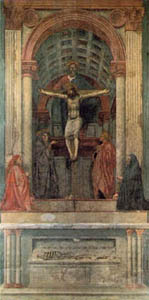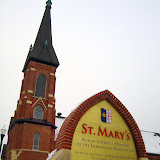This horrified review of the Nativity Story has been making the rounds online and via e-mail. What follows are my own personal thoughts, which are not infallible... and that's a good thing! :)
I do disagree with this review, primarily because it is a very emotional reaction to privately perceived theological flaws - the reviewers, as I see it, are reading heresy into the movie where it may or may not exist, and they react to their perceptions so strongly and with such "certainty" that we should doubt immediately their authority to do so. Why? Because the movie was MEANT to be ambigious in the areas of controversy between Protestants and Catholics (so as to avoid the very things that this review "saw"). Additionally, like all movies the experience of them is not objective - it is a subjective interpretation, an interpretation by the filmmakers and also an interpretation by the viewers. This review is, in my mind, a clear case of reading too much between the lines. (Only one example - the reviewers claim that the shepherds were not worshipping. What? They may not have looked like a Holy Communion holy card, but simply because one is not down on one knee does not mean that one is not worshipping. I perceived it entirely differently, I saw that they were so in awe of the God in front of them that they could not move, their hearts were worshipping more profoundly than any bodily gesture could convey.)
From my experience of the movie, nothing shown is objectivly a contradiction of Catholic understanding of Mary, her Immaculate Conception, the Virgin Birth or any other dogma and/or doctrine. It does hint at times to seeing Mary as more "normal" than Catholics understand her to be (she is seemingly pouty at times, and frustrated at others - neither of which are inherently sinful, but still). There are some interesting choices of which Scripture to use (ie, the Magnificat) - but it avoids them, it doesn't contradict them. It does show Mary having labor pains, an issue that has been debated for ages in the Church - it has been taught in various ways by various popes, but never fully defined. It is noteworthy to point out that Mary's labor in this movie is decidedly less than Elizabeth's - which does indeed draw attention to Mary's difference, and also points back to Genesis where God said that pains of birth would be *multiplied*. To multiply something means that there must be something there to begin with - because 0 x 0 is 0. So there is reason to hold that Mary could have had labor pains, just to a much lessor degree than other women - we just don't know. We know that the Church teaches she was a virgin before, during and after birth. But, "virginity" has never been defined by the Church either. And since the whole birth of Christ was a miracle to begin with, there is certainly reason to think that Mary could have gave birth either naturally to Jesus or supernaturally without "injuring her maternal virginity." One other intriguing point to remember, Scripture tells us that Jesus man was like us in ALL things but sin - all things would therefore seem to include being born as humans are born... In any case, the point is that the movie does portray the birth of Christ in some ways differently than a traditional Catholic understanding would have it - but, we have to face the reality that the Magisterium has simply not yet told us the play-by-play of the Nativity and there is room for other portrayls insofar as they do not deny the fundamental dogma of Mary's Immaculate Conception and the Virgin Birth. What I find more troubling, honestly, is that they show Jesus born without an umbilical cord!! Movie convenience aside, it would seem that on the natural level in order for Jesus to take flesh from Mary, and born of her, He would have had an umbilical cord! If I were like the reviewers below, I could read into the lack of an umbilical cord to mean that the moviemakers saw Mary in the classic Protestant sense as being a mere "incubator" and not the full Mother of God. However, I won't.
The movie does show Mary being confused and uncertain, more so than the Catholic understands her to be. In Luke, we hear her proclaim the Magnificat and we believe that she did indeed KNOW. However, it is also true that she was uncertain, she did ask Gabriel how it could be, and she and Joseph, 12 years later, were confused at Jesus' decision to remain at the Temple to "be about His Father's business". The key here is that Mary, in Scripture and in the movie, is portrayed with FAITH. This faith never leaves her, there is nothing to suggest that she does not trust God at all times, even when she is unsure. The big problem I have with Mary in this film is that she is badly cast and acted. But that is the fault of the actress and director, not of the screenwriters.
By reading this review, you as a Catholic will also likely ruin your own viewing of the movie, and deprive yourself of a good Christmas experience - because when you look for heresy in the midst of ambiguity (which this film is, ambigious at points of controversy - think "Mere Christianity"), you will find it. The movie, on its own, does not encourage heretical thinking unless we come to it with presuppositions that are heretical. Protestants, coming at it with their own ideas of Mary and Jesus, will see their view. Catholics who see it, will see it from the Catholic view - unless they are looking for something otherwise. I would also caution against accepting without question the interpretations that the review authors make regarding Church teaching - the quotations that the authors use are taken out of context of the original documents, and out of context of the still ongoing and authentic theological understanding of these aspects of the Faith. Just as it is dangerous to interpret Scripture personally (as the Protestants believe) it can also be dangerous to assume that we as individulas can interpret the papal and Magisterial writings on difficult theological concepts. God may be absolutely Simple, but we are not, and our understanding of things is necessarily not simple but complex because we are complex creatures. It's not as simple as quoting Pius and then saying "see - this contradicts that scene."
I do think that Catholics need to consider their own idea (and ideal) of Mary before going. I think the problem for this couple is that they have such a specific ideal for Our Lady that I do not think any depiction of her on the big screen would have sufficed. All possible screen Marys are too much like us, sinful and sorrowful. We have to realize that Our Lady is the only Mary, and she is not who is in the movies, only mere shadows of her are. If you, as a Catholic, are so much in love and in tune with Our Lady that you cannot tolerate seeing a "Mary" that is not the equal of our belief, that is not the match of the Madonna of the Pieta - then don't see the movie. This Mary is a real girl of our day trying to act as Our Lady might have been, and as such, she is NOT Mary. But I think if you go to it with an open mind and heart, you WILL see Mary here, and you will be drawn closer to our Lord's Nativity. I know many scenes from this movie are now a part of my daily Rosary meditation. The Visitation scene itself is simply amazing for prayerful reflection - I'm going to see the movie again just to see that part.
There is much about this movie to commend it, there is also a lot of technical and story writing flaws that prevent it from being a "great movie". There are many areas of theological ambiguity, and scenes that astute Catholics may not like. It could have been a great family movie, but because of the violent scenes of the Massacre of the Innocents and the very realistic birthing scenes, it is not suitable for very young children - too bad. There are many ways it could have been better, but there are at least as many ways that it could have been dramatically worse! Personally, I see it as a harmless, and perhaps helpful, presentation of the Biblical account of the Nativity, ala C.S. Lewis' "Mere Christianity" (done at the most basic common level of belief). The greatest thing about this movie, as I see it, is that it DOES portray Mary (and Joseph!) so admirably and spiritually - something that I don't think many of us expect from our Protestant brethern. First the Passion and now the Nativity - slowly but surely the way is being prepared for many Protestants to see the beauty of the Catholic understanding and honor for Mary and the saints. And that, surely, is a very good thing.
More discussion about this movie and this topic can be found at
Amy's and
at WDTPRS
here and
here.










